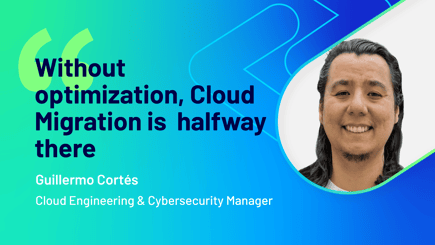.webp)
Why is migrating and managing projects on the cloud more cost-effective?
Migrating to the cloud speeds up processes and lowers costs, making businesses improve their revenue and operational efficiency levels. Several studies have shown that more than 60% of companies prefer to move and manage their technology infrastructure from the cloud. Coincidence, or an innovative way to evolve? Keep reading to find out!
To begin with, it's important to mention that migrating to the cloud consists of moving operations, IT assets, and everything that interferes with their operation to a data center that facilitates its access, handling, management, and administration. This is considered an essential step in aligning with today's digital transformation.
It is common to transfer legacy infrastructure to the cloud –that is– software or hardware that for a long time was the most reliable host. However, its vulnerability, slow performance, and poor maintenance have now become evident. These factors highlight the need to migrate, responding and setting the stage to face the challenges of the future.
Benefits of migrating to the cloud with a specialized provider
Migrating to the cloud is a fundamental decision to enhance the company's processes, but success depends, first and foremost, on the advice received and the strategy that is built, with the support of a cloud provider that understands the business needs.
When the strategic migration plan is carried out following each indication, the results will become evident over time, achieving substantial benefits such as:
1. Accessibility and business process control
Managing a project from the cloud allows you to have a simultaneously connected team, maintaining strict access control from different computers or devices. It sets up a workspace where participants can actively participate and maintain uninterrupted communication.
2. Business scalability and growth
Cloud technology offers the possibility to scale in order to support large workloads and a greater number of connected users, making processes run faster and with a higher guarantee percentage when compared to local servers, network equipment, or lower-capacity tools.
3. Increased efficiency and lower costs
Usually, businesses have a large budget to cover IT expenses. Between licenses, software, updates, and work equipment, the value of these costs is quite high. By moving to the cloud, organizations reduce costs by not having to think about the aforementioned items, because the provider is responsible for infrastructure control, maintenance, and technical assistance.
Additionally, there is substantial time saving, which can be used to strengthen operational processes, launch new products or create high-value business strategies that make the business grow at an accelerated pace.
This content will help you with your cloud strategy:
Protect and Optimize the Infrastructure of your Business Network with SASE
What is a Tech Lead and why is it a key role in tech projects?
What is Digital Transformation and why should you adopt it?
4. Quick response and better user experience
Migrating to the cloud is a strategy designed with the end customer in mind. When it's fully implemented, the latency period is reduced, that is, the time it takes to move from one server to another server during navigation so that the user finds an answer in less time and enjoys a pleasant experience.
5. Flexibility and digital expansion
Both users and employees can access cloud services and processes from wherever they are. This point makes business expansion possible, as well as gaining recognition thanks to the quality of its services and a flexibility point that reinforces the collaborator's efficiency.
6. Reduced maintenance time
The cloud infrastructure removes dependence upon complex installations, updates that prevent connection, or features that take time to activate. Its implementation and operation are characterized by being simple, automatic, easily accessible, and with certified support for maintenance.
7. First-class security
A specialized cloud provider provides top-notch security options. For example, there are recovery methods when integrations fail; enabling you to resume work after overcoming adverse situations such as viruses, incidents, or others; and it makes identity verification feasible to prevent the theft of confidential information.
This step is a very important change for the company, which is why it is advisable to prepare a preliminary plan and receive advice from a specialized partner. In addition, it's essential to take the following recommendations into consideration:
- Establish objectives, and map the objectives you wish to achieve by stages or by specific times.
- Create a security strategy that is not vulnerable, a firewall in the cloud can be an option to mitigate any risk that may arise.
- Copy data on a recurring basis to avoid information loss, especially during migration processes.








